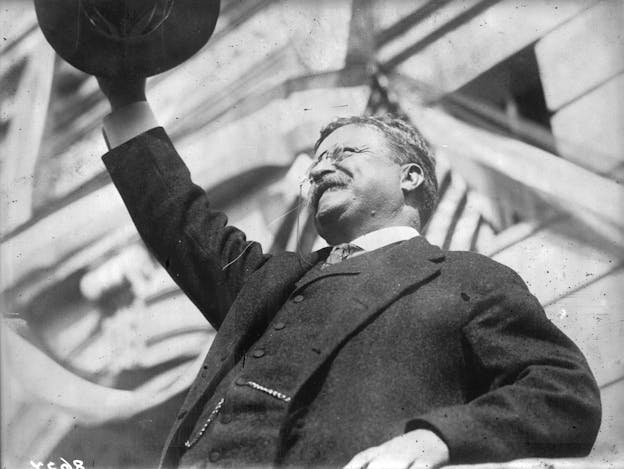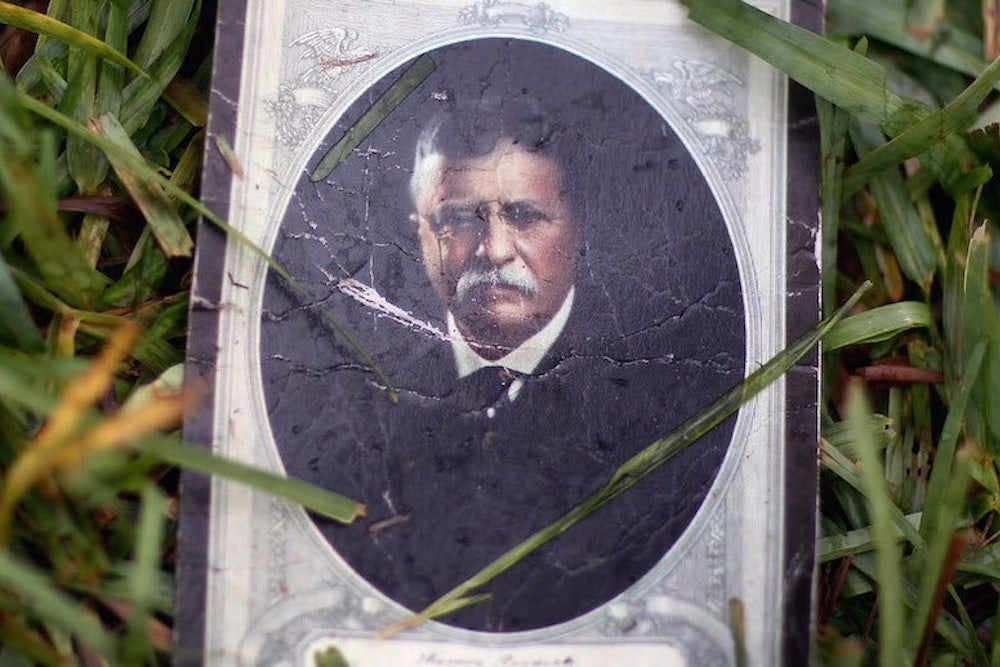The words and ways of the time are gone for him. He spoke them and he trod them. But what was timeless in him was what we loved in him.
He was life's lover and life's scorner. He explored it forever and was forever ready to leave it. He was not simply life's energy. He was not simply, beyond any other living man, life's eternal forthright force. He was the irrelevant curiosity of it and the vagrant wandering of it and the finding of great magics in it and the perpetual amazement of it and its laughter. He was everything in it, but its tears. Tears he put aside. Was death tearful? Was pain tearful? He sought it and dared it to its instant worst. When he boxed, he boxed close in and bled. When he hunted, he hunted with hardship. The defying of death, the enduring of pain, the living with bad eyes and with bad ears and the yet hearing well and the yet seeing well, or as well as possible—it was joy. He did not make life an end. Life for him was nothing but openings beyond, openings to effort and chance and to the joy of effort and chance, joy everlasting.
So to be with him was not simply to live more strivingly. It was to live more abundantly. A primrose by the river's brim became a prodigious episode in the migration of flowers. A shy child coming into the room became a romp and a riot. A dusty book chanced on in the garret became a gigantic pitiless controversy among scholars past and present and to be. A dead phrase became a political missile. There it lay. There it had always lain. Roosevelt stumbled on it, looked at it, roared, picked it up, hurled it at the right mark and exploded it into fame. Everything became something else. There ceased to be any such thing as the commonplace. There ceased to be any such thing as a solid jungle of plodding fact. Every turn was now, with him, a turn into radiant vistas. He made Theodore Roosevelt the most interesting thing in the world.' He seemed to do so. But when one had gone away from him one found that what he had really done was to make the world itself momentarily immortally interesting. He was the prism through which the light of day took on more colors than could be seen in anybody else's company. Him I can remember, and him I can carry with me in remembrance. But with him are buried a million gleaming patterns and pageants I now shall never see.

He was instinctive energy; and he was creative curiosity; and he went on then to his greatest greatness. This insatiable taster of life never fell into the heresy which damns the taster. He knew there were poisons. He set them down from his lips. And he knew the pit in which even the innocent but indiscriminate thirst of all life and of all sensation becomes a poisonous quicksand. He leaped over it. He might have been the greatest dilettante of his day. He might have been, in mind and in body, its greatest dandy. He might have been the most promiscuous absorber of its offerings. He became the most girded pursuer of its activities. He girt himself with choices and denials. The heresy of self-expression as an end, the heresy of self-development as an end, he met and conquered. Having perceived what things make life run on in joy forever even when the joy of the runner is gone, he chose such things. Things different he left. He perceived them, but he left them. He had a genius for the whole of life, but he had an even greater genius for the wholesome. With him one seemed to roam the world without limit and yet to return without soil. To be sophisticated to the very verge of the ultimate human abyss and yet to be as clean as a clean animal—that was his most extraordinary achievement and his most extraordinary legacy in the possibilities of the art of living. He lived, and he lived abundantly, he lived exuberantly, with all his universality, within submissions. He submitted to the continuing life of the individual and of the family and of what is greater than the family. And to that greater thing he gave his supreme submission. He gave it to the greatest cause he could perceive. He gave it to America.
It compelled him in, his young years from the labors of the naturalist to the labors of the public man. It furnished him with the one doctrine of his last years. Those last years were, if sadness could ever have touched him, sad. They were lonely. But they were lofty. They were his greatest. They were not his greatest intellectually or temperamentally. But, beyond compare, they were his greatest morally. In political detail he remained within the pettiness of politics, more so than ever, but in political devotion to what he thought to be essential public moral doctrine he went farther than he had ever before gone, out of the politician completely into the patriot and so into the prophet. Remonstrances came upon him floodingly. He was so full and so open about armies and navies and war with Germany. If he would only abridge, if he would only abate, he could so much better advance his party and advance himself. He replied with fury. Never by abridgment or abatement would he be President again. The tariff he might have reformed, or might have refused to reform, by circumstances. Here was a thing outside circumstances. That America should be ready to strike at need and that every American should be ready to lose himself in the stroke—on those terms, and on those terms only, was he interested in campaigns. He preached universal liability to national survival. He was preaching personal character. No submission, no character. No limitless loyalty, no manhood. No loss of self into America, no self. No life militant and at risk, no life triumphant and at joy.
Loyalties may change. Submissions may shift. Nations may give way to industries and to groupings of industries. Quarrels between governments may vanish and be replaced by quarrels between syndicates and between classes. National armies and fleets may melt into the armies and fleets of the bourgeoisie and of the proletariat. The red soldiers of Lenine may be succeeded by the green or purple soldiers of a greater and a more thorough than Lenine. Yet will the meaning of Roosevelt be there. Yet will his virtues be essential to mankind if mankind is not to be stagnant prey of every successive little wilful whirlwind of autocratic or democratic or communistic or anarchistic or eugenic adventures. Yet will the common man raise himself to self-sacrifice or perish in his personality and in his sons and daughters. Yet will the causes die which end in self-expression and self-development and the preciousness of not dying. Yet will the causes live and triumph which elicit from their followers the submission Roosevelt gave to a cause I must still dare to count not unworthy, even in this day of great causes—the cause of these new hills and these new valleys on which we try once more anew the experiment of a society to transfuse and to transcend the indubitable material struggle of class by the indubitable mystical claim of humanity—the cause of America.
So he himself still lives. He lives, I may hope, to believe that he did not give its full proper place to the struggle of class. He lives, I may hope, to see that patriotism by itself is sacrilegious because it rends the body of Christ and tears His seamless coat. I may hope. But plainly I see him striding on and beating the mist back with swinging elbows; and in the space beyond is the gravity of Washington and the fierceness of Jackson and the melancholy of Lincoln and all the riches of men in which we Americans are already so rich; and he turns his head on his shoulder; and he looks back; and I cannot hear him speak; but I can hear the thing that was his mark and the symbol of his meaning; I can hear the click of teeth with which he girded himself to all denial of things in himself that weaken and to all conquest in himself of things beyond; and I can hear him laugh. And to the gravity of Washington and the fierceness of Jackson and the melancholy of Lincoln I see added the timeless gayety of Roosevelt.
